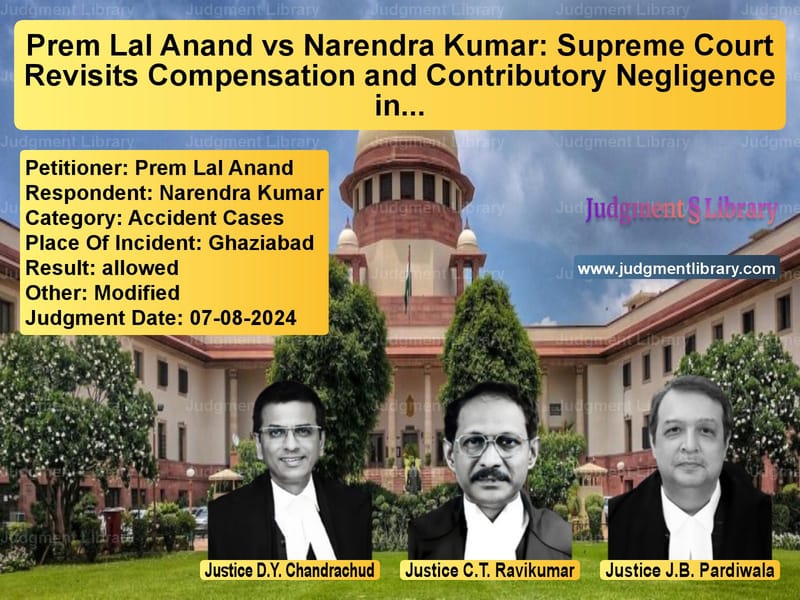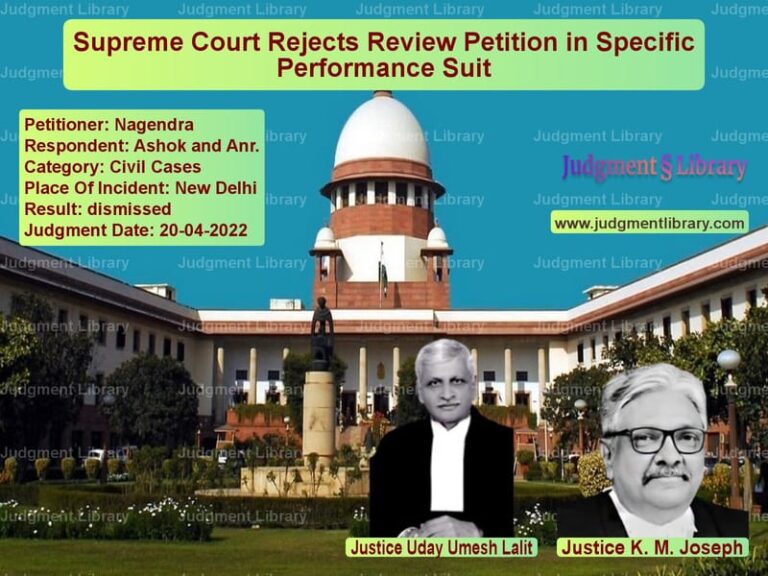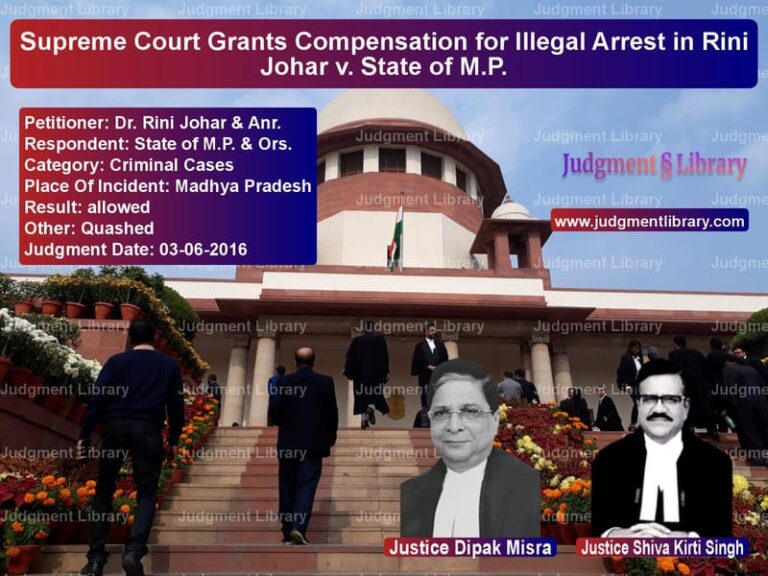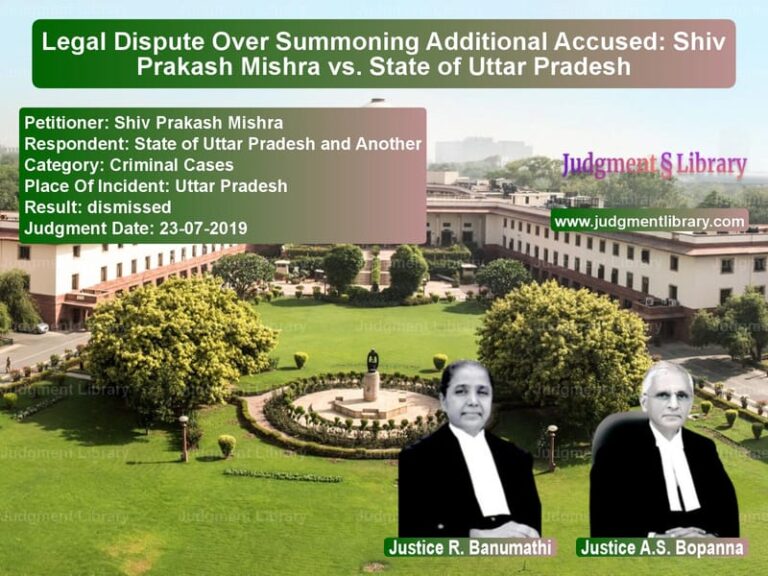Prem Lal Anand vs Narendra Kumar: Supreme Court Revisits Compensation and Contributory Negligence in Motor Accident Case
Prem Lal Anand and his family were victims of a devastating road accident on an ordinary day, a tragedy which quickly escalated into a complex legal battle, bringing critical issues of negligence, compensation, and judicial interpretation into sharp focus. This incident not only profoundly impacted the Anand family personally and financially but also led to significant clarifications from the judiciary about compensation principles under Indian law.
On the day of the incident, Prem Lal Anand, accompanied by his wife, was traveling by motorcycle through Ghaziabad when they collided with a tractor. This tragic collision led to the immediate death of Anand’s wife and serious injuries to Anand himself. The devastating event altered their lives forever, especially considering that Anand and his wife were joint proprietors of a thriving fabric business, M/s Sonali Fabrics, earning approximately Rs.5,000 per month collectively. This accident thus had a catastrophic financial and emotional impact on the Anand family.
Initial Tribunal Decision and Dispute
Anand sought compensation of Rs.12 lakhs from the Motor Accident Claims Tribunal (MACT) at Ghaziabad. After reviewing the facts, the Tribunal controversially attributed equal negligence to Anand and the driver of the tractor, thereby substantially reducing the potential compensation Anand would receive. The Tribunal’s final judgment stated explicitly:
“The Motor Accident Claim of Claimants for the compensation of Rs.12 Lacs is hereby rejected.”
It applied a multiplier of 9 to calculate the compensation, significantly limiting the awarded amount and leaving the claimants dissatisfied.
High Court’s Limited Revision and the Appeal to Supreme Court
Dissatisfied, Anand appealed to the Allahabad High Court, arguing that the Tribunal misapplied the multiplier. Although the High Court recognized an error in the multiplier calculation, partially adjusting it from 9 to 14, the broader issues of negligence and fair compensation remained unresolved. Consequently, Anand approached the apex court for final adjudication.
Detailed Arguments before the Supreme Court
Arguments by the Petitioners (Prem Lal Anand and Others)
The key points raised by Anand’s counsel before the apex court included:
- The error in attributing equal negligence to Anand for merely attempting a common maneuver of overtaking a slow-moving vehicle, arguing this act did not constitute rash or negligent driving.
- The misapplication of the multiplier method significantly reduced the compensation entitled to the family. They argued strongly that the correct multiplier, as per judicial precedents, was 15 and not 9 or even 14, thereby highlighting a significant oversight.
They cited relevant judicial precedents to underscore their position:
“It is the claimant-appellant(s) who lost a member of their family. Not only was the claimant-appellant, Prem Lal Anand doing an act which is an everyday occurrence on the road. Consequently, compensation awarded on this count has to be revised.”
Arguments by Respondents (Narendra Kumar and Others)
The respondents maintained their stance, emphasizing the perceived negligence by Anand in attempting to overtake a slow-moving tractor. They argued that Anand’s actions directly contributed to the accident and justified the Tribunal’s initial attribution of contributory negligence.
Supreme Court’s Detailed Observations on Contributory Negligence
The Supreme Court thoroughly analyzed contributory negligence by referencing pivotal precedents. The Court extensively cited the landmark case Municipal Corporation of Greater Bombay v. Laxman Iyer & Anr.:
“Negligence is failure to observe, for the protection of the interests of another person, the degree of care, the omission to do what the law obligates, or even the failure to do anything a prudent person would not do.”
The Court also emphasized clarity on contributory negligence, referencing another landmark judgment:
“In a case of contributory negligence, the crucial question on which liability depends would be whether either party could, by exercise of reasonable care, have avoided the consequence of the other’s negligence.”
Read also: https://judgmentlibrary.com/supreme-court-enhances-compensation-in-tamil-nadu-road-accident-case/
Critical Findings and Observations by the Supreme Court
The apex court thoroughly reviewed the case details, ultimately concluding:
“It is the claimant-appellant(s) who lost a member of their family. Not only was the claimant-appellant, Prem Lal Anand, doing an act which is an everyday occurrence on the road, but there was also nothing to suggest rashness or negligence. Consequently, the attribution of contributory negligence is erroneous.”
This judgment was significant because it rectified the misinterpretation that had significantly diminished the rightful compensation due to Anand and his family.
Correcting the Multiplier Method
The Court additionally addressed the critical error in calculating compensation, clarifying the correct application of the multiplier method following landmark judgments such as Sarla Verma vs. Delhi Transport Corporation and National Insurance Co. Ltd. vs. Pranay Sethi. The apex court reiterated:
“Considering the age of the deceased, 25% addition should be made to the established income as future prospects. Thus, the appropriate multiplier in this case should be 15.”
Final Verdict and Compensation Adjustment
The Supreme Court recalculated the compensation, firmly ruling in favor of Anand:
“Compensation as calculated, in accordance with the above discussion would be 75,000/- (including future prospects) x 15 (multiplier) = Rs. 11,25,000/-“.
Further, the Court adjusted the interest rate from 12% to a more equitable rate of 8% per annum, balancing fairness with prevailing norms.
This judgment represents a significant legal precedent, reaffirming key principles of fairness, just compensation, and judicial responsibility in motor accident claims, marking a crucial step toward justice for victims and their families nationwide.
Petitioner Name: Prem Lal Anand.Respondent Name: Narendra Kumar.Judgment By: Justice D.Y. Chandrachud, Justice C.T. Ravikumar, Justice J.B. Pardiwala.Place Of Incident: Ghaziabad.Judgment Date: 07-08-2024.
Don’t miss out on the full details! Download the complete judgment in PDF format below and gain valuable insights instantly!
Download Judgment: prem-lal-anand-vs-narendra-kumar-supreme-court-of-india-judgment-dated-07-08-2024.pdf
Directly Download Judgment: Directly download this Judgment
See all petitions in Road Accident Cases
See all petitions in Compensation Disputes
See all petitions in Motor Vehicle Act
See all petitions in Negligence Claims
See all petitions in Judgment by Dhananjaya Y Chandrachud
See all petitions in Judgment by C.T. Ravikumar
See all petitions in Judgment by J.B. Pardiwala
See all petitions in allowed
See all petitions in Modified
See all petitions in supreme court of India judgments August 2024
See all petitions in 2024 judgments
See all posts in Accident Cases Category
See all allowed petitions in Accident Cases Category
See all Dismissed petitions in Accident Cases Category
See all partially allowed petitions in Accident Cases Category







